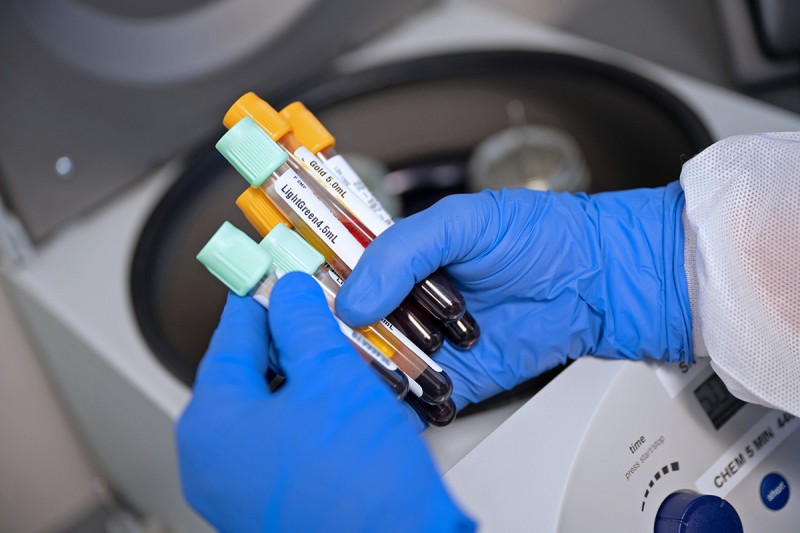
Numerous developments in cellular therapy, multiple myeloma, leukemia, and lymphoma are being presented by Memorial Sloan Kettering Cancer Center (MSK) researchers at the American Society of Hematology (ASH) Annual Meeting, which runs December 10-13. Below are some highlights.
A Phase I Study of CD19-Targeted 19(T2)28z1xx CAR T Cells in Adult Patients with Relapsed or Refractory Diffuse Large B-Cell Lymphoma
To date, only a subset of patients with relapsed or refractory diffuse large B-cell lymphoma have experienced durable remission with CAR T cell therapies and many experience treatment-related toxicities. This single-center, phase 1 trial was conducted at MSK, where a new type of targeted CAR T cell therapy — CD19-targeted 19(T2)28z1XX CAR T cells — was developed. The trial enrolled 16 patients to evaluate the safety and tolerability of the treatment, and to determine a recommended dose for a phase 2 trial. Overall, the treatment was shown to be safe with improved toxicity profiles, and had a complete response rate of 69%, which appeared durable over a median follow-up of 155 days. The findings will be presented at noon, December 10 by MSK hematologic oncologist Jae Park, MD. The therapy was developed in the lab of Michel Sadelain, MD, PhD, of the Sloan Kettering Institute, and was licensed by Takeda. Read the abstract.
Carfilzomib, Lenalidomide and Dexamethasone Versus Bortezomib, Lenalidomide, and Dexamethasone as Induction Therapy in Newly Diagnosed High-Risk Multiple Myeloma
Bortezomib, lenalidomide, dexamethasone (VRd) and carfilzomib, lenalidomide, dexamethasone (KRd) are standard induction regimens for the treatment of newly diagnosed multiple myeloma. A team of researchers from MSK examined outcomes associated with KRd and VRd induction in the management of patients with high-risk disease, who were excluded from the phase 3 ENDURANCE trial — a study designed specifically for patients with standard-risk newly diagnosed multiple myeloma. The retrospective chart review study found significant improvement in progression-free survival among high-risk patients who received KRd compared to VRd induction. “Until results from prospective randomized studies are available for [high-risk] patients, the use of various induction regimens in transplant-eligible patients opting for early transplant should be tailored to each patient,” the authors write. The findings will be presented at , December 12 by MSK hematologic oncologist Carlyn Tan, MD. Read the abstract.
Kinase Dead BTK Mutations Confer Resistance to Covalent and Noncovalent BTK Inhibitors But Are Susceptible to Clinical Stage BTK Degraders
Despite excellent outcomes for chronic lymphocytic leukemia patients treated with covalent BTK inhibitors, many patients ultimately develop resistance. Although BTK resistance mutations impede drug binding, new research makes the surprising observation that drug resistance substitutions can disable BTK’s enzymatic activity yet still enable B cell receptor (BCR) signaling, suggesting a nonenzymatic, or scaffolding, activity. The team’s findings uncover a heretofore unrecognized function of drug resistant BTK proteins, rendering BTK enzymatically dead yet retaining the ability to stimulate BCR signaling. Importantly, resistance to covalent and noncovalent BTK inhibitors is susceptible to a newly discovered clinical-grade BTK degrader compound, which is currently being tested in a phase 1b trial. The findings will be presented at , December 12 by MSK hematologic oncologist Omar Abdel-Wahab, MD. Read the abstract.
Subcutaneous Epcoritamab with Rituximab + Lenalidomide in Patients with Relapsed or Refractory Follicular Lymphoma: Phase 1/2 Trial Update
Advanced-stage follicular lymphoma — the most common indolent non-Hodgkin lymphoma — remains incurable and new treatment options for relapsed or refractory disease (R/R) are needed. In an ongoing phase 1b/2 trial evaluating epcoritamab in combination with rituximab and lenalidomide (R2) among 28 evaluable patients with R/R follicular lymphoma, the overall response rate was 100%, with a complete metabolic response observed in 96%. In arm 2b of the trial, the drug combination resulted in a 95% overall response rate in 41 patients, and 73% achieved a complete metabolic response. These encouraging results support the evaluation of the combination to improve clinical outcomes in patients with relapsed or refractory disease. An upcoming phase 3 trial will evaluate epcoritamab in combination with R2 versus R2 alone in a subset of these patients with at least one prior line of therapy. The abstract will be presented at on December 11 by MSK medical oncologist Lorenzo Falchi, MD. Read the abstract.
Analysis of 372 Adult Allograft Recipients Reveals Associations between Non-European Ancestry, Low Socioeconomic Status, and Receipt of HLA-Disparate Grafts
While race, ethnicity, and socioeconomic status (SES) impact care delivery for allograft candidates and recipients, the associations between ancestry, SES, and their interaction with donor type are not fully established. This research demonstrates an intersectionality between ancestry and SES, and an association with donor type, with the most vulnerable patients receiving the most complex (human leukocyte antigen-mismatched) transplants that require the highest level of care. Successful extension of transplant access to minority patients will be contingent on addressing this financial hardship. Moreover, different SES classification systems resulted in different assignment of SES — therefore interventions to advance equity will require better SES classifications, as well as detailed recording of household income. The findings will be presented at , December 10 by MSK research fellow Warren Fingrut, MD. Read the abstract.